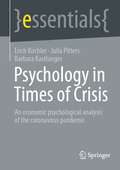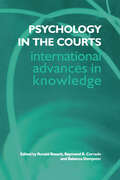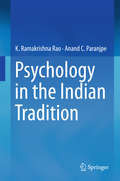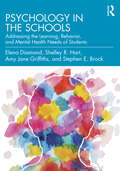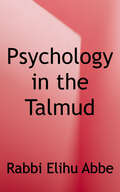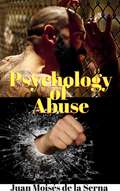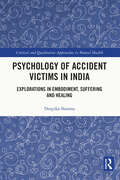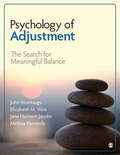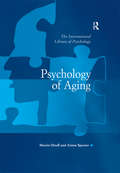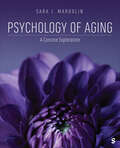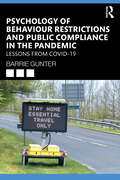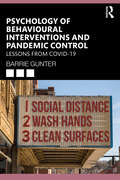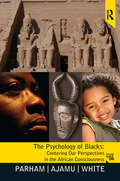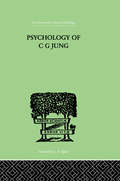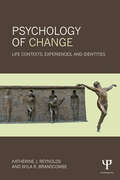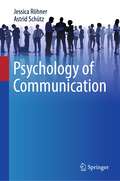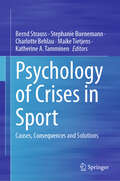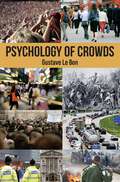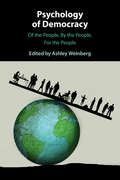- Table View
- List View
Psychology in Times of Crisis: An economic psychological analysis of the coronavirus pandemic (essentials)
by Erich Kirchler Julia Pitters Barbara KastlungerWhen the SARS-CoV-2 virus reached us in Europe, we panicked. Life was scaled down to the bare essentials and tentatively loosened up again. The lockdown is followed by huge changes. There is no return to familiar normality in sight. How did we experience the threat to our health and the changes to the familiar rituals of life? What followed shock and fear? How did we manage to discard long-rehearsed rituals and accept the challenges? How will we talk about the policies after the lockdown, what will we remember and what will we have learned from the crisis? This Essential offers an economic psychological analysis of the complex interplay between state, organisations and people from the beginning of the crisis to the repair phase.
Psychology in Your Life
by Sarah Grison Michael Gazzaniga Todd HeathertonAuthor Sarah Grison―an expert in the teaching of introductory psychology―has created a print and digital package with an equal commitment to the success of every instructor and student. A strong, author-driven support package―rich with original media, a test bank, Active Learning slides, and InQuizitive adaptive learning modules―provides instructors with everything they need to help today’s students understand and apply introductory psychology.
Psychology in Your Life (Fourth Edition)
by Michael S. Gazzaniga Sarah GrisonInclusive and research-based content, assessment, and teaching tools by an expert teacher Psychology in Your Life, Fourth Edition, provides instructors and students with new research-based, inclusive solutions to today's teaching challenges. A new IMPACT learning scaffold guides students on how to best learn and retain course material and new content addresses diversity both historically and in the field today. The content, pedagogy, and digital tools reflect the new learning outcomes and themes of the APA IPI. InQuizitive evidence-based assessment helps students build their comprehension of core concepts, while new Testmaker helps instructors create customized, outcome-driven summative assessments. A new interactive 3D brain, new interactive neuron animations, and new ZAPS 3.0 interactive labs make the psychological concepts interactive and accessible for students. This purchase offers access to the digital ebook only.
Psychology in the Bathroom
by Nick HaslamPresenting cutting-edge science in a playful manner, this exploration of a topic that has been veiled by taboo, the psychology of excretion, surveys an assortment of embarrassing processes, shameful disorders and disgusting habits taking the reader on a tour of the history and literature of elimination.
Psychology in the Courts: International Advances In Knowledge
by Ronald Roesch Raymond R. Corrado Rebecca DempsterThis book provides a useful overview of the latest research into the interaction between psychology and the courts. Leading scholars and practitioners review recent research and practice in a number of principal areas:* adolescents in the legal system* the role of juries* competency to stand trial* conditional release* eyewitness evidence and testimony* the role of the victims.
Psychology in the Indian Tradition
by K. Ramakrishna Rao Anand C. ParanjpeThis authoritative volume, written by two well-known psychologist-philosophers, presents a model of the person and its implications for psychological theory and practice. Professors Ramakrishna Rao and Anand Paranjpe draw the contours of Indian psychology, describe the methods of study, explain crucial concepts, and discuss the central ideas and their application, illustrating them with insightful case studies and judicious reviews of available research data and existing scholarly literature. The main theme is organized around the thesis that psychology is the study of the person and that the person is a unique composite of body, mind and consciousness. The goal of the person is self-realization. Self-realization consists in the realization of one's true self as distinct from the manifest ego and it is facilitated by cultivating consciousness. Cultivating consciousness leads to a kind of psycho-spiritual symbiosis resulting in personal transformation, altruistic value orientation and flowering of the hidden human potential.
Psychology in the Schools: Addressing the Learning, Behavior, and Mental Health Needs of Students
by Stephen E. Brock Shelley R. Hart Elena Diamond Amy Jane GriffithsThis engaging and practical book addresses the multitude of ways in which school-employed psychological service providers such as school counselors, school psychologists, and school social workers, can support the learning, behavioral, and mental health needs of students in school settings. Psychology in the Schools offers vignette examples to apply content to real-world context and provides a variety of resources including worksheets and templates for practitioners to use in practice. Chapter content covers foundations in psychological services in schools (e.g., the hidden curriculum of school systems, professional standards of practice, consultation and collaboration, and assessment), an overview of social, emotional, behavioral, and academic supports across tiers of service delivery, and skills for practitioners to thrive (e.g., burnout prevention). This text is ideal for an upper-level undergraduate course or an introductory graduate-level course. Early career practitioners and supervisors alike can also benefit from the tools and resources that this book provides.
Psychology in the Schools: Addressing the Learning, Behavior, and Mental Health Needs of Students
by Stephen E. Brock Shelley R. Hart Elena Diamond Amy Jane GriffithsThis engaging and practical book addresses the multitude of ways in which school-employed psychological service providers such as school counselors, school psychologists, and school social workers, can support the learning, behavioral, and mental health needs of students in school settings.Psychology in the Schools offers vignette examples to apply content to real-world context and provides a variety of resources including worksheets and templates for practitioners to use in practice. Chapter content covers foundations in psychological services in schools (e.g., the hidden curriculum of school systems, professional standards of practice, consultation and collaboration, and assessment), an overview of social, emotional, behavioral, and academic supports across tiers of service delivery, and skills for practitioners to thrive (e.g., burnout prevention).This text is ideal for an upper-level undergraduate course or an introductory graduate-level course. Early career practitioners and supervisors alike can also benefit from the tools and resources that this book provides.
Psychology in the Talmud: Guidelines for Simchah and Personal Growth
by Rabbi Elihu AbbeThis book uncovers important insights from the Jewish tradition and offers tools for success, joy, growth, and inspiration. Timeless ideas are elaborated on from the writings of classical Torah commentaries as well as current leaders in the fields of psychology and personal growth. Short summaries enable readers to more easily implement these crucial concepts into their lives.
Psychology of Abuse
by Juan Moises de la SernaIn this eBook, we will approach one of the most important themes of our time, abuse, both physical and psychological, from a new perspective. This eBook will help us know a reality that is scarcely talked about beyond the circles of health and safety specialists, and that is extended all through life. Abuse in all its forms will affect every individual in different ways, despite the efforts made by some authorities to stop social inequalities, such as gender violence.
Psychology of Accident Victims in India: Explorations in Embodiment, Suffering and Healing (Critical and Qualitative Approaches to Mental Health Experiences among Vulnerable Groups)
by Deepika SharmaThis book traces the psychological journey of accident survivors with locomotor disability, as they move from processes of suffering to healing. It provides a holistic understanding of disability by looking into the embodied understanding of the body as shaped by the socio-political and cultural discourses around impairment. The book addresses the lack of critical qualitative research on the health and well-being of Persons with Disabilities (PWDs) by developing a nuanced understanding of their experiences. It showcases the challenges PWDs face and the process of recovery and regaining agency through interviews and personal narratives. It also highlights the steps we need to take to better understand and address the everyday needs of PWDs and make our society more inclusive. An important addition to the research on disability studies in the Global South, this book will be useful to researchers and students interested in the areas such as disability studies, critical health psychology, mental health of vulnerable populations, and qualitative research as well as professionals working in the area of health and rehabilitation. People engaged in policymaking related to disability services, rehabilitation and rights will also find this book helpful.
Psychology of Adjustment: The Search for Meaningful Balance
by John N. Moritsugu Melissa J. Kennedy Elizabeth M. Vera Jane K. Harmon JacobsPsychology of Adjustment: The Search for Meaningful Balance combines a student focus with state-of-the-art theory and research to help readers understand and adjust to life in a context of continuous change, challenge, and opportunity. Incorporating existential and third wave behavioral psychology perspectives, the authors emphasize the importance of meaning, mindfulness, and psychologically-informed awareness and skill. An inviting writing style, examples from broad ethnic, cultural, gender, and geographic areas, ample pedagogical support, and cutting-edge topical coverage make this a psychological adjustment text for the 21st century.
Psychology of Adjustment: The Search for Meaningful Balance
by John N. Moritsugu Melissa J. Kennedy Elizabeth M. Vera Jane K. Harmon JacobsPsychology of Adjustment: The Search for Meaningful Balance combines a student focus with state-of-the-art theory and research to help readers understand and adjust to life in a context of continuous change, challenge, and opportunity. Incorporating existential and third wave behavioral psychology perspectives, the authors emphasize the importance of meaning, mindfulness, and psychologically-informed awareness and skill. An inviting writing style, examples from broad ethnic, cultural, gender, and geographic areas, ample pedagogical support, and cutting-edge topical coverage make this a psychological adjustment text for the 21st century.
Psychology of Aging (The International Library of Psychology)
by Aimee SpectorThe psychology of aging is an exciting and rapidly-developing field. This volume provides a collection of classic, original and often widely-cited papers, including some older papers which may be hard to find through conventional searches. Taken together, they help to address some key questions: what are the cognitive changes related to aging? Is mental exercise useful? To what extent might intelligence, education or stimulating mental activities delay or even reduce cognitive symptoms of dementia? However, the book goes well beyond cognition and addresses social and emotional changes in aging, as well as looking at how lifestyle factors may be influential in psychological functioning. The section on the psychology of dementia covers the evolving psychological models, plus innovative types of psychological interventions. As more people live to an age where they are dependent on others, the book also considers the stresses on carers and how carers can be supported. Lastly, other aspects of mental health problems in old-age are addressed, including depression, PTSD and personality disorder. This collection of intriguing and inspiring papers will liven up the shelves of students, researchers and academics in the field as well as being a very useful resource for research, teaching and study.
Psychology of Aging: A Concise Exploration
by Sara J. MargolinIn Psychology of Aging: A Concise Exploration, author Sara J. Margolin redefines how we think about getting older. Employing a bio-psycho-social perspective, Margolin introduces modern learners to the study of adulthood and aging, offering a holistic examination of its impact on our bodies, minds, relationships, and social roles. Through an innovative myth vs. fact approach, the text dispels common misconceptions using humor, compassion, and robust research. Emphasizing real-life aging processes and adaptations, students gain insights applicable not only to future careers but also within family and personal life contexts. Included with this title: LMS Cartridge: Import this title′s instructor resources into your school′s learning management system (LMS) and save time. Don′t use an LMS? You can still access all of the same online resources for this title via the password-protected Instructor Resource Site. Select the Resources tab on this page to learn more.
Psychology of Aging: A Concise Exploration
by Sara J. MargolinIn Psychology of Aging: A Concise Exploration, author Sara J. Margolin redefines how we think about getting older. Employing a bio-psycho-social perspective, Margolin introduces modern learners to the study of adulthood and aging, offering a holistic examination of its impact on our bodies, minds, relationships, and social roles. Through an innovative myth vs. fact approach, the text dispels common misconceptions using humor, compassion, and robust research. Emphasizing real-life aging processes and adaptations, students gain insights applicable not only to future careers but also within family and personal life contexts. Included with this title: LMS Cartridge: Import this title′s instructor resources into your school′s learning management system (LMS) and save time. Don′t use an LMS? You can still access all of the same online resources for this title via the password-protected Instructor Resource Site. Select the Resources tab on this page to learn more.
Psychology of Behaviour Restrictions and Public Compliance in the Pandemic: Lessons from COVID-19
by Barrie GunterThis volume examines the topic of compliance with COVID-19 restrictions, and the non-pharmaceutical measures taken by governments in attempts to bring the pandemic under control. Discovery that COVID-19 was largely transmitted through the air meant that public health strategies were needed to limit close physical contact between people. Epidemiological modelling offered initial interventions to tackle the rate of spread, but to be effective these measures were dependent on widespread public adoption and compliance. This book examines the key theories and empirical approaches to behavioural change and compliance, and reviews research on their relative effectiveness in driving public behaviour. Author Barrie Gunter considers four principal models used: nudge theory, social identity-group processes theory, theory of planned behaviour and the capability-opportunity-motivation-behaviour (COM-B) model. Gunter weighs the pros and cons of each, offers commentary on lessons that can be learned from their application during the pandemic, and what they may have to offer in a triangulated approach, theoretically, methodologically and in terms of policy making. Examining not just the extent of compliance but also the psychological drivers of this behaviour over time, this is essential reading for students and researchers in psychology, public health and medical sciences, and policy makers assessing government strategies, responses and performance.
Psychology of Behavioural Interventions and Pandemic Control: Lessons from COVID-19 (Lessons from the COVID-19 Pandemic)
by Barrie GunterPsychology of Behavioural Interventions and Pandemic Control is a unique text that examines the COVID-19 pandemic in relation to population risk factors and the efficacy of non-pharmaceutical interventions deployed by many governments around the world to bring the pandemic under control. The book presents critical and insightful lessons that can be drawn up to assess governments’ performance in relation to the pandemic and to guide the construction of effective measures to put in place in readiness for any future public health crises on this scale. It starts by examining lessons learned from historical pandemics and then turns to early epidemiological modelling that influenced the decision of many governments to implement wide-ranging interventions designed to bring public behaviour under close control. It also examines the findings of research that tried to understand pre-existing population risks factors which had some mediating influences over COVID-19, mortality rates, and the effects of interventions. Early modelling work is critiqued, and the discussion also identifies weaknesses in early modelling research. The author, Barrie Gunter, goes on to consider ways in which multiple disciplines can be triangulated to produce more comprehensive models of risk. He also offers suggestions on how future pandemic-related research might be constructed to deliver more powerful analyses of the effects of interventions and the role played by different population risk factors. This insight might then deliver better policies for pandemic control and for safe release from that control. This is essential reading for students and researchers in psychology, public health and medical sciences. It would also be of interest to policy makers assessing government strategies, responses and performance.
Psychology of Blacks: Centering Our Perspectives in the African Consciousness
by Adisa Ajamu Joseph L. White Thomas A ParhamFor courses in Introduction to Psychology, African American Psychology, African American Studies, Multicultural Counseling and Cross Cultural Counseling and Psychotherapy.This text highlights the limitations of traditional psychological theories and approaches when applied to people of African descent. It provides information on how the African Centered Perspective is defined, as well as how it operates in the context of the African American family with regard to identity development, education, mental health, research, and managing contemporary issues. It links the context of African American life to the traditions, values and spiritual essence of their African ancestors in an attempt to acknowledge the African worldview and assist the African American community in addressing some of the challenges they continue to face.
Psychology of C G Jung (International Library Of Psychology Ser.)
by Jacobi, JolandeThis is Volume III of twelve in the Analytical Psychology Series. Originally published in 1942 the present work has grown out of a lecture given before a group of psychologists, physicians, and educators and this is the fifth edition giving a presentation of the elements of Jung’s psychology that is intended to give a concise picture, complete in itself, of the central content of the whole system, and above all to facilitate access to Jung's own extraordinarily voluminous works.
Psychology of Change: Life Contexts, Experiences, and Identities
by Nyla R. Branscombe Katherine J. ReynoldsChoice Recommended Read This volume tackles the critical question of whether people change or whether they remain relatively constant across the lifespan. Much existing literature in psychology has largely endorsed the concept of stability. Indeed, in many people’s minds, the person is understood to be set in stone, as a function of early socialization and reaching a particular stage of development, evolutionary processes, or traits that are hard-wired from the beginning by genes and biology. However, in recent years, important scientific developments in theory and research concerning the psychology of change have emerged. In contrast to the commonly held conception of the individual as fixed, this research illustrates how malleable people are—showing much behavioral plasticity. The chapters in this volume, written by scholars at the cutting-edge of research into the psychology of change, showcase these developments with the aim of advancing knowledge of the field and encouraging further research. Topics addressed include brain function, cognitive performance, personality, psychological well-being, collective action to achieve social change, responses to life stressors, and political change. The message is clear—the culture we live in, what happens to us along the way, and who we think we are and want to be, can all change people.
Psychology of Communication
by Jessica Röhner Astrid SchützThis successful textbook on the psychology of communication explains - here in English for the first time - how human communication works in a very understandable way. It begins with the explanation of central terms and the explanation of known communication models (e.g. the models according to Schulz von Thun, Watzlawick, Hargie and colleagues), then describes means of non-verbal and verbal communication and ends with a clear and structured summary of communication forms. Concrete fields of application, stumbling blocks (e.g. intercultural differences in communication), practical examples and digressions in the book round off what has been read and consolidate what has been learned. In addition, free learning materials are available on the Internet with which readers can test their knowledge acquisition.
Psychology of Crises in Sport: Causes, Consequences and Solutions
by Bernd Strauss Stephanie Buenemann Charlotte Behlau Maike Tietjens Katherine A. TamminenThe book includes ideas and concepts from psychology in general, particularly sport psychology, and communication sciences, as well as applied sport psychology and case studies. In each chapter, the reader will first learn the theoretical and empirical background of concepts related to crises, and second, they will be introduced to how to apply this knowledge and methods to prevent and cope with crises. Throughout the book, well-known examples and case studies are addressed to gain a full understanding of crises.
Psychology of Crowds
by Gustave Le BonIn this clear and vivid book, Gustave Le Bon throws light on the unconscious irrational workings of group thought and mass emotion as he places crowd ideology in opposition to free-thinking and independent minded individuals. He also shows how the behaviour of an individual changes when she/he is part of a crowd.Le Bon was an eminent psychologist and sociologist. The ideas le Bon explores in this book are extremely relevant to today's society and were of pivotal importance in the early years of group psychology: Sigmund Freud's Massenpsychologie und Ich-Analyse (1921); (English translation Group Psychology and the Analysis of the Ego, 1922) was based on Le Bon's work. Applications include financial market behaviour and political delusions.The original of this work, La Psychologie des Foules, was first translated anonymously into English possibly by a group of French students. Sparkling Books has corrected errors and anomalies in the original translation by reference to the Alcan edition. We have shortened a few passages but maintained the original footnotes and have added some footnotes of our own. Contents>Book One - The Mind of Crowds General characteristics of crowds and the psychological law of their mental unity The sentiments and morality of crowds The ideas, reasoning power, and imagination of crowds The religious nature of crowd convictions Book Two - The Opinions and Beliefs of Crowds Indirect factors of the opinions and beliefs of crowds Direct factors of the opinions of crowds The leaders of crowds and their means of persuasion Fixed beliefs and changeable opinions of crowds Book Three - The Classification and Description of the Different Kinds of Crowds The classification of crowds Crowds committing crimes Criminal juries Electoral assemblies
Psychology of Democracy: Of the People, By the People, For the People
by Ashley WeinbergDemocracy was forged in the furnaces of oppression, whether combatting tyranny or affirming the rights of the individual. As democracy is under threat in many parts of the world, there has never been a more urgent need to understand political thoughts and behaviours. This lucid and accessible book brings together a global group of scholars from psychology, political science, communication, sociology, education and psychiatry. The book's structure, based on Abraham Lincoln's well-known phrase 'Of, by and for' the people, scrutinises the psychological factors experienced by politicians as representatives 'of' the electorate, the political institutions and systems devised 'by' those we elect, and the societies that influence the context 'for' us as citizens. From trust to risk, from political values to moral and religious priorities, from the personality and language of leaders to fake news and anti-democratic forces, this book provides vital new insights for researchers, politicians and citizens alike.
